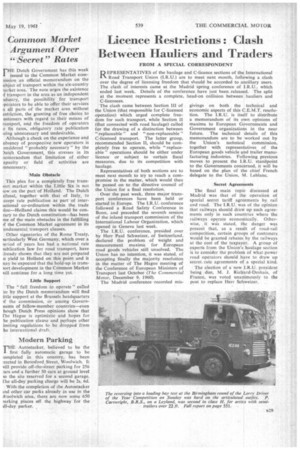Licence Restrictions:. Clash Between Hauliers and Traders
Page 35

If you've noticed an error in this article please click here to report it so we can fix it.
FROM A SPECIAL CORRESPONDENT
D EPRESENTATIVES of the haulage and C-licence sections of the International Road Transport Union (1.R.U.) are to meet next month, following a clash over the degree of licensing freedom that should be accorded to ancillary users. The clash of interests came at the Madrid spring conference of I.R.U., which ended last week. Details of the conference have just been released, The split at the moment represents a complete, head-on collision between hauliers and C-licensees.
The clash came between Section III of the Union (that responsible for C-licensed operation) which urged complete freedom for such transport, while Section 11 (that connected with road haulage) called for the drawing of a distinction between " replaceable " and " non-replaceable" C-licensed transport. The latter group, recommended Section TT, should be completely free to operate, while "replaceable" operations should be either under licence or subject to certain fiscal measures, due to its competition with haulage.
Representatives of both sections are to meet next month to try to reach a compromise in the matter, which would then be passed on to the directive council of the Union for a final resolution.
Over the past week, three major transport conferences have been held or started in Europe. The T.R.U. conference followed a Road Safety Conference in Bonn, and preceded the seventh session of the inland transport commission of the International Labour Organization, which opened in Geneva last week.
The I.R.U. conference, presided over by Herr Paul Schweizer, of Switzerland, declared the problem of weight and measurement maxima for European road goods vehicles still unsolved. The Union has no intention, it was stated, of accepting finally the majority resolution in the matter of The Hague meeting of the Conference of European Ministers of Transport last October (The Commercial Motor, December 9, 1960).
The Madrid conference recorded mis givings on both the technical and economic aspects of this C.E.M.T. resolution. The 1.R.U. is itself to distribute a memorandum of its own opinions of maxima to European Governments and Government organizations in the near future. The technical details of this memorandum are to be worked out by the Union's technical commission, together with representatives of the European goods vehicle and trailer manufacturing industries. Following previous moves to present the I.R.U. standpoint to the Governments concerned, it will be based on the plan of the chief French delegate to the Union, M. Leblanc.
Secret Agreements
The final main topic discussed at Madrid was that of the operation of special secret tariff agreements by rail and road. The T.R.U. was of the opinion that railways should draw up such agreements only in such countries where the railways operate economically. Otherwise, it was stated, the danger was present that, as a result of road-rail competition, certain groups of customers would be granted rebates by the railways at the cost of the taxpayer. A group of experts from the Union's haulage section is to consider the problem of what•power road operators should have to draw up secret rate agreements of a special kind.
The election of a new I.R.U. president being due, M. J. Richard-Deshais, of France, was voted unanimously to the post to replace Herr Schweizer.




























































































































